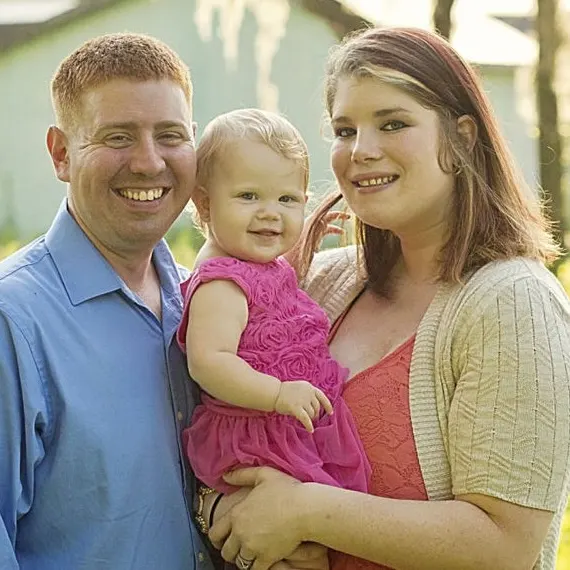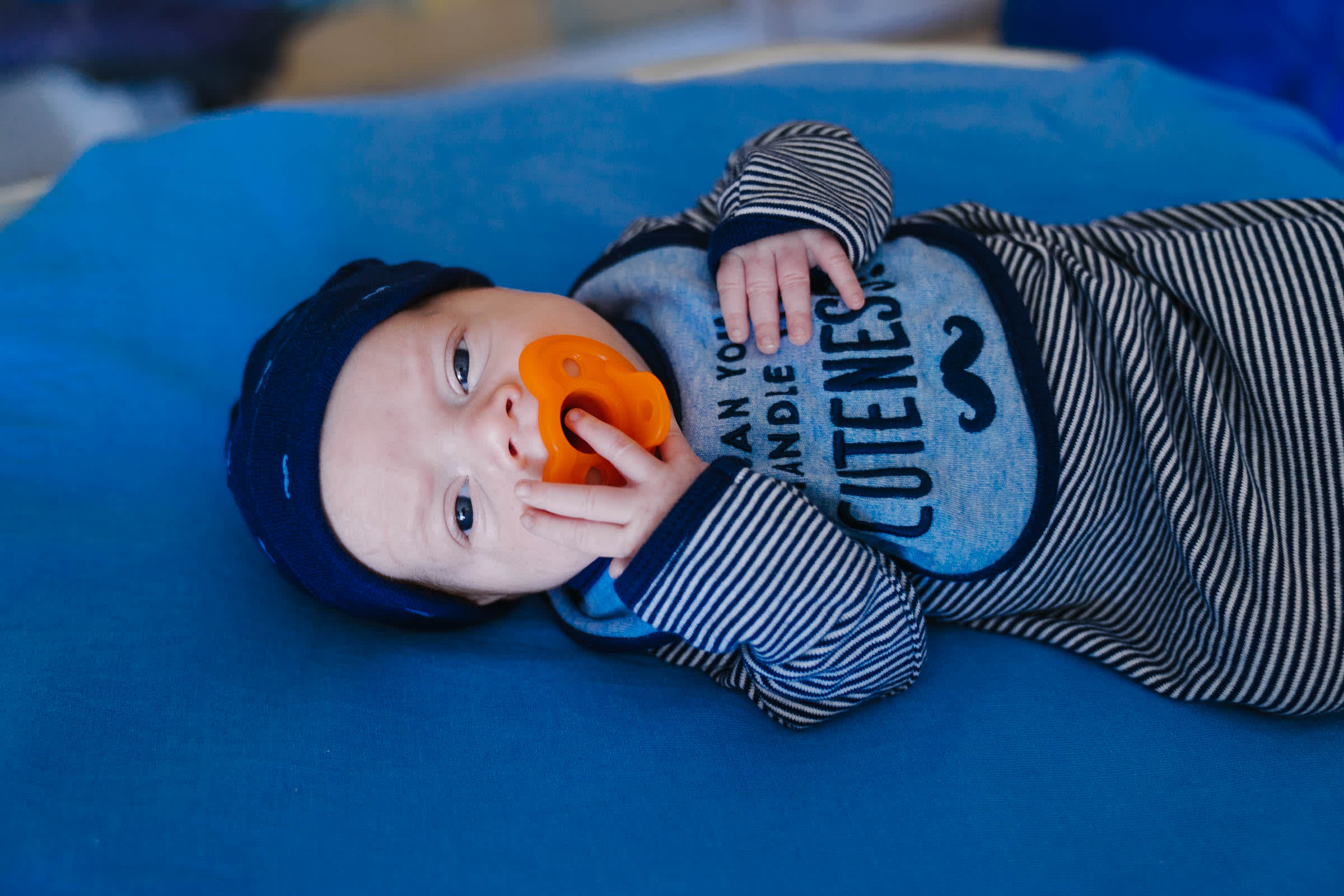
Adult Congenital Heart Patient Puts Her Heart Into Motherhood
Jacksonville, Florida — June 3, 2014
Rebecca Zwass-Brown suffers from the same ailments most pregnant women in their third trimester deal with, including swollen ankles and indigestion. But for Rebecca, 24, who feels that being able to carry a baby at all is a miracle, the aches and pains that come with it are no big deal after what she’s been though in her life.
“My husband and I came into this thinking we couldn’t have a baby, so it’s amazing that I can even carry a baby and have so few problems,” she says. “It’s been great so far.”
Not one to let her health stand in the way of her goals, Rebecca put her heart into living her life by going to college, earning an MBA, getting married and, with the advice and guidance of her pediatric cardiologists and pediatric cardiothoracic surgeons with the Adult Congenital Heart Program, beginning a family. But getting to that point wasn’t easy.
Born with multiple heart defects that required her to undergo six surgeries from the time she was an infant to her last one two years ago, Rebecca often faced long, difficult recoveries and limitations on what she could do. After her first surgery (performed at another pediatric cardiology center because her family didn’t live in the area at the time), she developed a narrowing of her pulmonary artery, the main vessel leading from the heart to the lungs. She had several more surgeries at other children’s hospitals throughout her childhood before her family moved to the Jacksonville area in 2005.
Soon after, her pulmonary valve was replaced by pediatric cardiothoracic surgeons with UF Health Pediatric Cardiovascular Center, which is affiliated with Wolfson Children’s Hospital. The narrowing of her valve had caused an increased workload on the right side of her heart. By the time she had this valve replacement surgery at age 19, the accumulation of scar tissue from her previous surgeries made her recovery slow and difficult, and every surgery came with more risk. In the end, she suffered the same result: her condition made it more and more difficult to lead a normal life.
Rebecca attributes the once seemingly impossible goal of becoming a mother to her pediatric cardiovascular team with the Adult Congenital Heart Program, and to the Melody Transcatheter Pulmonary Valve procedure she underwent in April of 2012. The minimally invasive procedure is accomplished without the need to open the chest to gain access to the leaky blood vessel that leads to the defective pulmonary valve. Instead, a pediatric cardiologist threads a delivery catheter through a small incision in a leg vein, then deploys a bovine (cow) valve that’s sewn inside of a wire stent through the defective valve with use of an angioplasty balloon on the end of the catheter. While this procedure doesn’t prevent other surgeries from being necessary in the future, its less invasive nature reduces scar tissue build-up and allows for a quicker recovery than open heart surgery.
Rebecca’s pediatric cardiologist, Robert English, MD, says: “The new valve certainly relieved a lot of workload on her heart and by getting the valve implanted via catheter instead of through invasive cardiopulmonary bypass surgery, her heart wasn’t subjected to the additional stress of a major, open heart procedure. Those two things combined allowed her heart to be strong enough to endure a pregnancy.”
To make sure that the swollen ankles and heart palpitations she sometimes experiences are due to a normal pregnancy and not a problem with her heart, Rebecca sees Dr. English once a month for a cardiac ultrasound to look for signs of valve failure. In addition, Rebecca sees her OB/GYN every two weeks to monitor her blood pressure and weight and she is checked by a maternal-fetal medicine physician (high-risk OB) every four weeks to monitor the baby’s growth and health.
All feel confident that she will carry the baby to term, and should be able to have a vaginal delivery. After the birth, she will continue to be monitored regularly by Dr. English to make sure her heart regulates to its pre-pregnancy pumping capacity. Also easing Rebecca’s mind is the knowledge that even though there a three to four percent risk that her child could have a congenital heart defect, the type of defect she has is one that typically isn’t passed on.
“With the evolution of care and more children surviving thanks to the advances in pediatric heart surgery, children have a higher-than-ever likelihood of reaching adulthood with congenital heart disease,” says Brandon Kuebler, MD, a pediatric cardiologist and adult congenital heart specialist with the UF Health Pediatric Cardiovascular Center and Wolfson Children’s Hospital. “Fifty years ago, the odds of a child with severe congenital heart disease surviving to adulthood were only about 12 percent. Now 80 to 90 percent will reach that milestone. As far as the opportunity for them to go on to have families, that is possible as well with close monitoring.”
Part of that evolution involves a continuum of care once patients reach adulthood. Patients with congenital heart defects who had multiple surgeries during childhood generally were released from care once they became adults, Dr. Kuebler explains. Now it’s understood that providing continual monitoring is a necessity to ensure the patient’s current health and well-being, as well as to lower the risk of him other developing a problem down the road because something went undetected. And the best specialist to care for congenital heart disease at any age is the congenital cardiovascular specialists, usually associated with pediatric cardiology programs.
As for the here and now, Rebecca admits to relaxing a little more as her due date draws closer, and enjoying each moment of the experience. Sometime around July 4th in a Labor & Delivery Room at Baptist Medical Center Jacksonville, she is looking forward to holding little Peyton Amelia in her arms – and close to her heart.
“It’s truly a miracle,” says Rebecca. “She’s our little miracle child.”

Giving to Wolfson Children's
As the only not-for-profit children’s hospital in Northeast Florida, Wolfson Children’s Hospital relies on the generous support of moms and dads, grandmas and grandpas, and others who care deeply about the health and well-being of kids in our region. You can help by making a secure online gift or by calling 904.202.2919.
